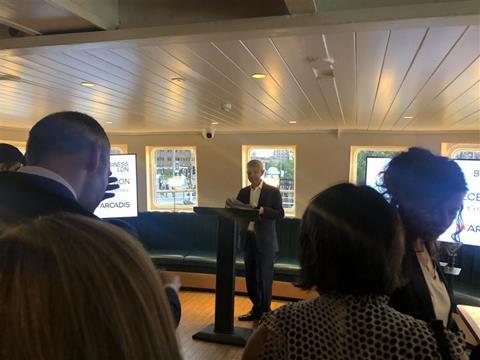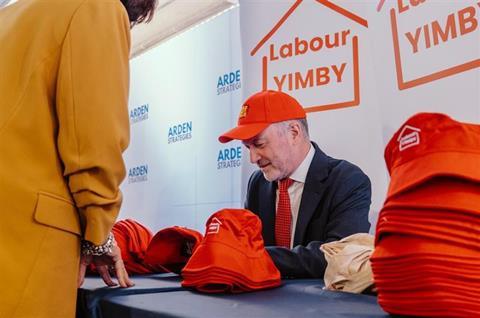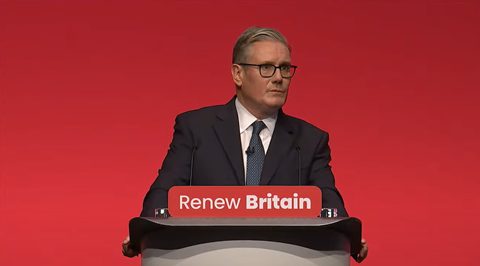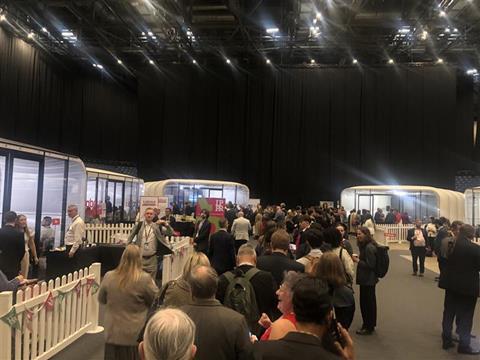The government’s announcement about new towns and the housing secretary’s Trump-esque stylings put housing at the heart of the agenda at Labour’s conference in Liverpool. But there was little in the way of detail to back Steve Reed’s ‘build, baby, build’ slogan

When, in 2007, the British indie rock band The Wombats first sang “I’m back in Liverpool and everything seems the same”, it is safe to assume that they were not talking about the experience of attending this year’s Labour Party conference, which returned to the port city this week in circumstances that could not have seemed more different from 12 months ago.
The 2024 event was a triumphal affair, coming on the back of a landslide general election victory. One year and several high-profile scandals later, the party is struggling in the polls and facing a revitalised right in the form of Nigel Farage’s Reform Party.
“It is clearly more subdued this year,” Mark Washer, chief executive of Sovereign Network Group, mused to Building in a hotel lobby on the edge of the convention centre. “[Last year] it was hugely enthusiastic. The government hadn’t been in power for more than four or five months at that point.”
Contributing to the sense of unease this year was the prospect of a leadership challenge from Andy Burnham, which hung over the event’s opening days, drawing attention away from Keir Starmer and his team. Indeed, the interest in the Manchester mayor at this year’s conference was almost enough to literally knock a person over. Standing in a hallway in the convention centre, Building’s reporter had barely a second to register Burnham brushing past before being spun around by the shoal of 15 to 20 paparazzi, reporters and personal protection officers trailing in his wake.
New towns announcement brings housing to the fore once again
Were it not for the mayor’s antics, housing might well have hogged the headlines on the first day of conference. On the eve of the event, the party sent out a press release announcing the findings of its new towns taskforce and committing to beginning at least three developments before the end of the parliament. The prime minister even made it a major part of his spiel in the media rounds on Sunday morning – a fairly clear indication that housing delivery is still a major Labour priority despite Angela Rayner’s defenestration.
>> Also read: Sector leaders welcome new towns announcement but warn of viability and infrastructure challenges
The announcement was the cue for a number of built environment-adjacent organisations with fringe events at the conference to hurriedly rebrand their events to explore the issue, although a few fortunate organisers happened to have picked the topic anyway. The key to delivering the programme effectively, according to many, is getting the infrastructure right.
At a Labour Housing Group event on Sunday, Julia Buckley MP, a member of the environment audit committee, noted that “people’s experience of development in the last 15 years has been housing estates without infrastructure”. They would need convincing that new towns would not mean more of the same, she said.
View from the waterfront: London leaders at the Labour conference

London’s development community was out in force in Liverpool on Sunday night, with many attending BusinessLDN’s reception on a boat called Daffodil moored on Canning Dock. Given the current development lull in the capital, it was a lively affair, with feelings towards the government still broadly positive.
Not everyone seemed thrilled to be at the conference, with one exec privately complaining that it had been made necessary by the reshuffle, which saw almost all construction-facing ministers move chairs.
Sadiq Khan made a speech celebrating the successes of the capital and stressing the need to push for “lots of investment in London” in the upcoming Bbudget. The mayor also made a few jibes towards his party’s new home secretary, joking at the beginning of his address: “I’ve just had a message to speed up my speech, because I’ve been told Shabana Mahmood has arrived in Liverpool and she’s clamping down on small boats.”
Meanwhile, Chris Curtis MP, co-chair of the Labour Growth Group and on the Commons housing committee, stressed the funding challenge, noting that the £700m which his new-town constituency of Milton Keynes was given for its development in the 1960s would be worth around £12bn today. “If you’re doing 12 new towns at £12bn, you get to a number that the British state is not going to be able to afford so that we’re going to have to finance them in different ways,” he said.
Curtis suggested that development corporations could be given the power to issue their own bonds. He also raised the question of whether new-town delivery would have to be additional to local housing targets in constituencies like his, where the proposed site of the development overlaps substantially with the existing local authority area.
In a session run by the YIMBY Initiative, Anna Smith, Cambridge city councillor and former deputy mayor for the Cambridge and Peterborough Combined Authority, said that two schemes in her area provided examples of diverging approaches to large-scale development. Northstowe, she said, had been “built with no real planning” and that residents who had been “promised the earth” had been left disappointed. Meanwhile, Waterbeach showed what can be achieved by “putting in GPs [and] shops from day one, even if they’re in portacabins”.
She said that having amenities and community events running from the very beginning meant that “people are seeing the benefit of that development before it even happens”.
New housing secretary’s Trump-esque headwear garners attention, but little detail on ‘acceleration’ plans
While the pre-announcement of the new towns programme left little of note for the new housing secretary, Steve Reed, to announce, he was nonetheless one of the loudest voices across the conference. In his speech to the conference floor on Sunday, Reed praised his predecessor Angela Rayner to huge cheers as a “true working class hero”, before celebrating the government’s achievements on housing so far and promising to “build, baby, build”.
It is a slogan that Reed has repeated at every opportunity since he was given his new brief less than a month ago, and he seems to be keen to make it a kind of personal brand. At the end of his speech, the secretary of state donned a red baseball cap emblazoned with the line, which bears more than a passing resemblance to Donald Trump’s “drill, baby, drill” mantra.
This merch, apparently distributed by the pro-development Labour YIMBY group, ended up being one of the most noticeable features around the conference. Reed could be seen handing (and throwing) out “build, baby, build” caps and bucket hats at raucous Labour YIMBY rallies on Monday afternoon and evening.

More broadly, responses to the secretary of state’s new rhetoric were mixed. Tom Hunt, the Labour leader of Sheffield City Council, speaking on a RIBA panel on quality, said that what was needed was “the right houses, in the right places, with the right infrastructure”, sardonically adding: “That is a longer slogan than you can fit a baseball cap, but maybe we’ll get a shirt or something.”
Mark Washer diplomatically described the slogan and attire as “a particular style”, while welcoming “the level of enthusiasm”. Fellow social housing chief, Mel Barrett, at MTVH, also welcomed the rhetoric as “consistent and positive”.
On LinkedIn, strategic planning specialist Catriona Riddell, who advised Labour in the run-up to the election, was critical of the Trump-esque phrase. Responding to an RTPI LinkedIn post from the conference which included a picture of the infamous hat, Riddell wrote: “Can we stop with the cap please?
“The RTPI is a wide church and the ‘build baby build’ slogan and MAGA style hat is not a good look for a membership organisation which is all about the creation of good places.”
In a building safety panel organised by the Fire Brigades Union, Giles Grover, a campaigner with End Our Cladding Scandal, described Reed’s rhetoric as “embarrassing” and “cringeworthy”. He said the new housing secretary’s hat stunt was “landing so poorly with hundreds of thousands of people who wait for our homes to be made safe”.
Grover agreed that it was important to get the Building Safety Regulator (BSR) working to avoid the “weaponisation” of the regulator to weaken safety requirements. “I’m seeing history repeat itself,” he said. “We’re already seeing that weaponisation of the BSR. We’re already seeing a new secretary of state start talking about unnecessary regulation.”
Speaking on the same panel, Joe Powell, the MP for the constituency in which Grenfell sits, struck a more measured tone, urging people to “really try and distinguish vibes from policy”. He said he had not seen any policy shift on building safety and described the trade-off between safety and delivery as a “false choice”.
At another panel event, Labour YIMBY’s Adam Allnutt played down criticism of the hat stunt, which he said was meant in jest. ”Yes, it’s a MAGA hat, that is the point, It’s funny,” he said. “We all need a bit of a morale boost after what’s been a relatively tough period.”
Government often listens to the biggest voices in the construction and infrastructure world. Those are not the guys that do the training. It’s their supply chains
Steve Mulholland, chief executive of the Construction Plant-hire Association
While the new style of rhetoric Reed has brought to the ministry divided opinion within the conference, it is unlikely to make much of an impression in the actual construction and housbuilding sector until it is backed up with detailed proposals, which have so far been lacking. The new housing secretary will ultimately be judged on the contents of the currently vague “acceleration package” he has been promising, rather than vapid three-word slogans.
Optimism about new regulatory chief and pleas for patience
Whatever the views of the housing secretary, there appeared to be widespread warm feelings towards the new boss at the BSR, who is tasked with turning the organisation around after a very challenging launch. Speaking to Building after the panel on safety, Grover indicated his confidence in Andy Roe, describing him as “a breath of fresh air”.
Elsewhere in the conference, deputy mayor of London for housing, Tom Copley, also said that Roe was “the man for the job”, adding: “He fixed the LFB [London Fire Brigade] and he can fix the Building Safety Regulator.”
Copley told Building he had already met Reed and the new team and had been encouraged by the meeting, as well as expressing his satisfaction at Matthew Pennycook keeping his role as housing minister.
Speaking on a New Statesman panel shortly after, Copley gave the biggest hint at the timescale for Reed’s acceleration package. “We’re working with the government on a package of measures which we hope to be able to announce in the next couple of weeks, which will be aimed at kick starting development,” he said.
Housebuilding was not the only construction issue discussed at the conference, and Reed not the only new construction-related minister. The “big construction debate” on Tuesday morning, chaired by Building’s own editorial director Chloe McCulloch, was attended by Chris McDonald, the new “construction minister”.
The MP for Stockton North’s official title in government is minister for industry, with construction and infrastructure just two of 11 sectors falling under his jurisdiction. Nevertheless, McDonald insisted that he wanted to be ”a visible and vocal champion for the industry” and said he was interested in “leading a change in the national mood” to be more pro-development.
>> Also read: Housing minister denies government has tasked Tory peer with writing second planning bill
The two-part session also saw Brian Berry, chief executive of the FMB, call for “some sort of tax break for more small employers to take on apprentices”, while Steve Mulholland, chief executive of the Construction Plant-hire Association, also called on the government to be more attentive to SMEs.
“The government often listens to the biggest voices in the construction and infrastructure world,” he said. ”Those are not the guys that do the training. It’s their supply chains.”
Meanwhile, Rico Wojtulewicz, head of policy and market insight at the NFB, urged those impatient for new development to understand that the current market is a reflection of ”Conservative government commissions being built out”.
Elsewhere, there was a discussion of how co-operatives could help to deliver the UK’s retrofit goals, with Joseph Davis Coates, heat and retrofit coordinator at Community Energy England, explaining that such organisations could bridge the gap in trust that exists in the market. “One of the main reasons why cooperative community energy is so important in this space is that trust is so essential to get people to take action,” he said.
He explained that, while 36% of people in the UK trust domestic business as a whole, 62% trust co-ops.

No major infrastructure announcement as Labour leaders focus speeches on political battles
On the main floor of the conference, there was not a huge amount for the built environment to glean from the speeches of Labour’s top team. On Monday, Rachel Reeves once again stressed the need for fiscal discipline, celebrated the government’s backing for Sizewell C and described the country as being faced with a “stark choice” between “investment or decline”.
There was no grand announcement on Northern Powerhouse Rail, with Reeves only offering the tepid promise to “push ahead” with plans. This was not much of a surprise – after months of rumours that it was set to be a headline conference announcement, national newspapers reported ahead of the conference that this was no longer likely.
In her own speech, transport secretary Heidi Alexander elaborated that the government didn’t want to “repeat the mistakes of the past” by announcing schemes “with no plan to deliver them”. She said that “new infrastructure will be the physical embodiment of our ambition”, but that they “need to get the basics right too”.
>> Also read: Starmer announces new educational target including apprenticeships
The prime minister’s speech did contain one matter of note for the industry – a firm emphasis on the value of apprenticeships. Musing on his father’s experience as a toolmaker, he told delegates: “He always felt disrespected, my dad, undervalued by the nation because he worked with his hands.”
Starmer announced that the government goal of sending half of the UK’s young people to university, first set by the New Labour government in the 2000s, would be replaced “with a new ambition that two-thirds of our children should go either to university or take a gold standard apprenticeship”.
But this was a largely political speech, written to draw clear dividing lines between himself and Farage’s Reform UK, which looks increasingly likely to be Labour’s main opposition going into the next election. Starmer warned against taking the “path of decline”, told people not to listen to politicians offering a “miracle cure” and accused Farage of talking down the country.

It is hardly surprising that the prime minister is trying to land blows on Farage and his party, given current state of the polls. A More in Common MRP released on the eve of the conference projected a 96-seat majority for the hard-right party. It is a sign of the trouble Labour is in that the pollster’s event, entitled “How can Labour rebuild its electoral coalition”, drew one of the biggest crowds across the conference fringe.
It was not all doom and gloom, with findings suggesting that a crucial demographic of swing voters is still open to giving the party the chance to turn things around. But, as things stand, even More in Common’s best-case scenario for the party has them in second place.
The challenge of dealing with more extreme elements on the political right, after a summer of protest outside asylum hotels, was also a topic of conversation across the conference, including at housing-related events. Fiona Fletcher Smith, chief executive of L&Q, noted that housing was a major source of discontent among many of the protestors.
If you live in Barking and Dagenham, and you’re on a waiting list for social housing, and if you want a three-bedroom flat or three-bedroom house, you will wait 25 years
Fiona Fletcher Smith, chief executive of L&Q
“If you listen to some of the words around the protesters, from the protesters at asylum hotels, what they’re actually talking about is not just immigration – the the root of their concern is housing,” she told a New Statesman event. “What you’ll hear is: ‘These people come in on boats and get housed [but] my daughter’s been on a waiting list for 10 years, my son can’t get housing, he can’t afford a mortgage, he can’t afford the rent’.”
She suggested that to deal with growing “hatred” in the country, politicians needed to fix the housing crisis. “The London Borough of Barking and Dagenham has seen far-right activity in the past and then dealt with it very effectively,” she said. “But, if you live in Barking and Dagenham, and you’re on a waiting list for social housing, and if you want a three-bedroom flat or three-bedroom house, you will wait 25 years.”
While much of what the government has done in just over a year has been welcomed across the built environment sector, its focus has been on laying the groundwork for delivery over the longer term. Whether it gets the opportunity to realise its plans will be determined more by disgruntled voters than by construction and housing executives.


























No comments yet